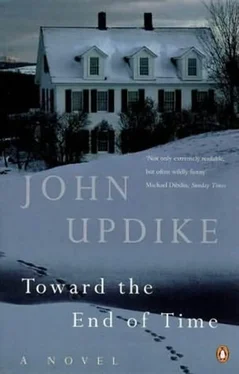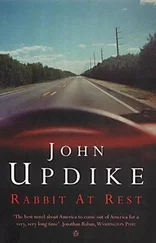John Updike - Toward the End of Time
Здесь есть возможность читать онлайн «John Updike - Toward the End of Time» весь текст электронной книги совершенно бесплатно (целиком полную версию без сокращений). В некоторых случаях можно слушать аудио, скачать через торрент в формате fb2 и присутствует краткое содержание. Жанр: Современная проза, на английском языке. Описание произведения, (предисловие) а так же отзывы посетителей доступны на портале библиотеки ЛибКат.
- Название:Toward the End of Time
- Автор:
- Жанр:
- Год:неизвестен
- ISBN:нет данных
- Рейтинг книги:3 / 5. Голосов: 1
-
Избранное:Добавить в избранное
- Отзывы:
-
Ваша оценка:
- 60
- 1
- 2
- 3
- 4
- 5
Toward the End of Time: краткое содержание, описание и аннотация
Предлагаем к чтению аннотацию, описание, краткое содержание или предисловие (зависит от того, что написал сам автор книги «Toward the End of Time»). Если вы не нашли необходимую информацию о книге — напишите в комментариях, мы постараемся отыскать её.
Toward the End of Time — читать онлайн бесплатно полную книгу (весь текст) целиком
Ниже представлен текст книги, разбитый по страницам. Система сохранения места последней прочитанной страницы, позволяет с удобством читать онлайн бесплатно книгу «Toward the End of Time», без необходимости каждый раз заново искать на чём Вы остановились. Поставьте закладку, и сможете в любой момент перейти на страницу, на которой закончили чтение.
Интервал:
Закладка:
The storm gone northeast to Newfoundland, the weather is clear and calm. The sea has milky stripes of extra calm in it, and even the lobster boats on the far side of Cat Island look sharp and white and close. Twenty miles away, the shore of Hingham and Hull-where last July I could see fireworks go off, fuzzy and faint as comets-floats a sharp, detailed blue above a mirroring width of what seems sheer air.
Other optical illusions:
1. Shaving the other morning, I saw what seemed a giant bright-amber butterfly flapping frantically at my bathroom window, and only slowly realized that it was my stirred-up shaving water, into which I kept dipping my razor, reflecting electric light back into the window, semi-opaque at that newly shadowy 7:00 a.m. hour.
2. On the first day that I felt I had strength to walk down to the mailbox, I saw, as I shuffled (“One small step for a man…”) through the turn in the driveway, a long dark silhouette of something perched crookedly on the mailbox lid. My first thought was that a great bird, a crane or buzzard or pterodactyl, had alighted there; my next, that a package toe big to fit inside had been attached to the outside catch with rubber bands at a weird angle. Then, as I fearfully advanced I saw the shadow to be a piece of low hemlock limb intervening in my field of out-of-practice vision. It was always there. I had not taken this walk for seven weeks.

The vines in the woods-poison ivy and Virginia creeper- are beginning to redden, and the maples, each in its way. The tall red maple, so called, gradually turns a sober burgundy, while the more impulsive, larger-leaved sugar maple flashes into swathes of orange and a neon pink. The Norway maples planted downtown in the village will yield a clear yellow a bit duller than the hickories’. I saw from the car window as Gloria drove me to the Lahey Clinic in Danvers for some blood tests a splendid tall hickory whose outer leaves, basking in the mellow September sunlight, were still green, while the shaded inner leaves were already golden- a core of gold, a flickering inner life sheathed in seemly decorum; it gave the impression, as we sped by in the Infiniti, of a captive girlish soul, a twirling dryad.
Roberta brought Keith and Jennifer to visit me-my children have become solicitous, fluttering bothersomely, albeit loyally, about the wreck of my progenitive apparatus, whereby they came to be. In their adult, wrinkling faces I still see the plump cheeks and candid trusting gaze of ten-year-olds looking to me for protection and guidance and, most difficult to provide, entertainment. How can I explain that I must be left alone, without any pulling and hauling from loving kin, if I am to heal? That I have had my use of the world and my only salvation lies within, in tending the altar of my wound and waiting for nature or the force beyond it to slide me subtly away from my own disaster, by an invisible series of steps, into another world?
We fed Jennifer lunch. She kept taking the silver porringer, which cost a fistful of scrip at Firestone & Parson, and dumping its contents on the high-chair tray and then deliberately dropping the already much-dented porringer to the floor. The fourth time she did it, with her challenging slate-blue stare directly on me, I exploded. “Stop it ,” I said to Jennifer, and to Roberta, whiningly, “Why does she keep doing that?”
The baby, who had recently had her first birthday, was not used to being shouted at; her mouth formed a tiny circlet, with a bubble in it, before her lips downturned and she began to cry, to howl, and then to sob and sniffle.
Roberta comforted her. “Oh, Precious,” she said, “Grampy didn’t mean it; he’s just forgotten what little girls are like.” To me she explained, “Daddy, it’s just her way of getting used to space.”
My daughter’s remark, derived no doubt from some digitized handbook of child development, was helpful: I saw an affinity between the infant and myself, beyond our both being clad in diapers. With gestures and perceptions as fumbling as hers, I was getting used to time .
It is a curious entity. It doesn’t exist, I have read, at the particle level: the basic laws of physics are time-symmetric, but for one tiny exception, the particle called the neutral kaon. Were it not for the neutral kaon, perhaps, buildings would self-assemble as frequently as they collapse, and old men would become young in more than their dreams.
In my dreams, I seem to roam a long harvest table heaped with the past eras of my life. One night, I am back in Hammond Falls High School, swinging down the locker-lined halls in my penny loafers and frayed blue jeans-frayed and torn up to the limit the school dress code allows, for beneath the anti-social pose I am a conscientious student, with a college career and lifelong escape from Hammond Falls my sneaking ambition. I chestily inhale effluvia of hair oil and cheap perfume and hormonal overproduction; I eye the knockout girls in their rounded sweaters and pleated skirts and anticipate a Saturday-night sally into Pittsfield with my pals-dinner at the Dalton Avenue McDonald’s or Teo’s and a movie at the Showplace or the Capitol on North Street, followed by apple pie at Rosa’s or the Popcorn Wagon. City streets, illegal beers, lamplight reflected in black puddles, freedom and sin around the corner. The tender heat and latent violence of high school, its fast crass glamour, are all around me, along with the quaint orderliness of its hourly bells and scheduled migrations from room to room. Killers in our walks, we of the Class of 71 are yet as docile as concentration-camp inmates. Though the “system” is widely mocked and deplored, no better has materialized to rescue us from these locker-lined halls, with their hopeful, rebellious clatter.
Then I wake to my soaked diapers, the patter of squirrels on the roof, and the odd construction, like a crazy-angled coffin, buried in the far corner of the guest-room ceiling. With a deadly lurch in my stomach I realize I will never attend high school again, not unless time reverses. Another night, I am still married to Perdita, in our colonial house on East Main Street in Coverdale; we are vaguely surrounded by children in all sizes, but the real seethe is between us and our peers, the other young couples, all closeted in their homes yet dying to burst out, each marital partner helplessly seeking, as in a beaker of jiggled chemicals, to bond with another. A thrilling, tragic tangle of illicit alliances past and future is spread beneath us like a net beneath the flying bodies of trapeze artists; we are still lithe, though in our thirties. Our houses and gardens are neglected; our children signal for our attention in the corners of our eyes. The melting walls of domesticity, the too-many points of contact-with spouses, lovers, would-be lovers, still-living parents, children daily growing more complicated and knowing, cats and dogs whose sudden deaths underline the terror of it all-engulf my sleeping mind, steeped in its liquorous essence of Turnbull. Perdita, gorgeously and pitiably naked, is sobbing her eyes out in the pantry while a party we are giving is still going on; I am conscious of the social impropriety of her smooth, mythic costume, and awake, dawningly grateful that I need not any more unravel the reason for her grief.
What a prodigy of storage it is that all the stages of my life are coiled in my brain, with their stresses and stimulations. My present abject condition is another dish on the harvest table, a shipboard buffet heaped up backwards between the fluorescent soup of life at Sibbes, Dudley, and Wise and the plum pudding of the childhood Christmas when I got my first set of skis-wooden ones, and secondhand, I could see from the nicks of wear. Time in my brain has become a kind of space-areas of coiled cerebrum across which enlivening electricity idly sizzles in my sleep.
Читать дальшеИнтервал:
Закладка:
Похожие книги на «Toward the End of Time»
Представляем Вашему вниманию похожие книги на «Toward the End of Time» списком для выбора. Мы отобрали схожую по названию и смыслу литературу в надежде предоставить читателям больше вариантов отыскать новые, интересные, ещё непрочитанные произведения.
Обсуждение, отзывы о книге «Toward the End of Time» и просто собственные мнения читателей. Оставьте ваши комментарии, напишите, что Вы думаете о произведении, его смысле или главных героях. Укажите что конкретно понравилось, а что нет, и почему Вы так считаете.












